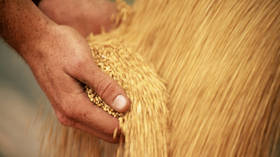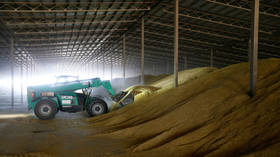Five EU nations push to extend ban on Ukrainian grain

Five EU member states will ask Brussels for an extension of the ban on imports of Ukrainian grain to the bloc, Polish Agriculture Minister Robert Telus said on Wednesday, following a meeting with representatives from Hungary, Slovakia, Romania, and Bulgaria.
According to Reuters, Telus and his counterparts from the four nations signed a common declaration regarding the extension of the ban until at least the end of the year, which they will present in talks with the European Commission.
“But also in the agreement is our joint declaration that we are very open to transit,” Telus was quoted as saying by the outlet.
Polish Prime Minister Mateusz Morawiecki, meanwhile, warned that his country may ban products from Ukraine unilaterally if the EU fails to come up with mechanisms and regulations that will protect Polish farmers when the official EU ban expires.
The five EU member states maintain restrictions on imports of Ukrainian wheat, corn, rapeseed, and sunflower oil. The curbs were introduced by Brussels in May to protect farmers from the influx of cheap Ukrainian grain, which flooded markets after the EU suspended customs duties following the launch of Russia’s military operation last year. The embargo still allows the transit of Ukrainian grain through the five countries, and is due to expire on September 15.
However, there are now concerns that Ukrainian produce could once again flow into those countries’ markets, following the termination of the Black Sea Initiative – a UN-brokered deal between Ukraine and Russia that allowed Ukrainian grain to be transported via the Black Sea.
Hungarian Agriculture Minister Istvan Nagy said last week that keeping the ban on Ukrainian grain imports in place was “the only way to protect the interests of European farmers.”
Slovak Agriculture Minister Jozef Bires told a news conference on Monday that the five states were working on an official statement for the European Commission “to consider our specific situation” and extend the restrictions, as well as expand them to include other products.
“We support Ukraine in every way, but under the condition that food imports can’t distort the internal market,” Bires said.
For more stories on economy & finance visit RT's business section













